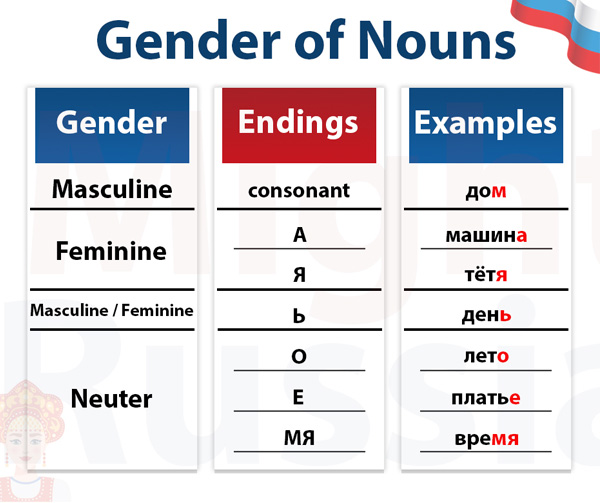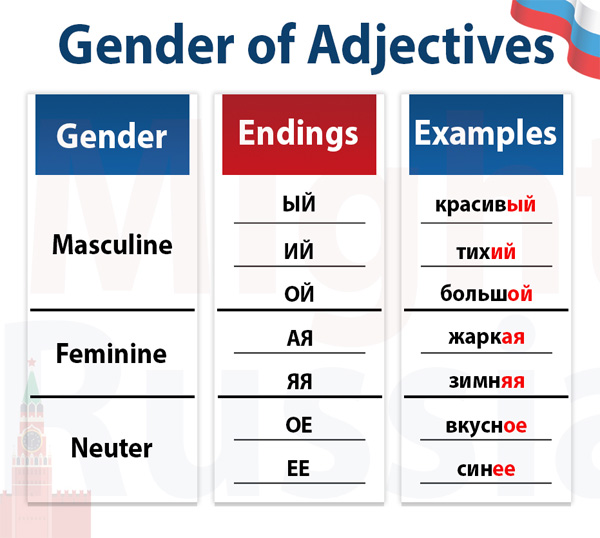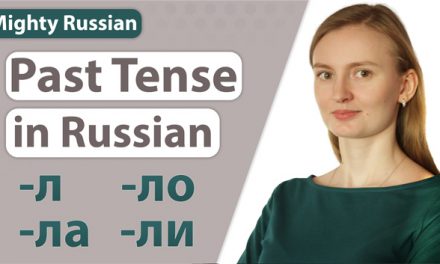It seems that you are looking at an outdated version of this lesson.
Click here to see the latest version of it, which includes examples with audio, integration with our dictionary and exercises.
Gender in the Russian Language
Gender in Russian is extremely important and this is one of the first things you have to learn.
There are many subjects in the Russian language that are closely related to gender, such as the 6 Russian cases, pronouns and adjectives.
So, in order to make progress in Russian, you must understand the concept of gender.
But what is gender?
In English, there are few words that have gender. For example, “an actor” is masculine and “an actress” is feminine.
In Russian, however, every single noun is masculine, feminine or neuter.
For example, “a table” is considered to be masculine, “a car” feminine and “a window” neuter.
I know that can be weird for a native English speaker.
To be honest, even native Russian speakers wouldn’t be able to explain why some objects are masculine, feminine or neuter.
That is just the way the Russian language is.
Now, the good news is that you don’t need to worry if you are still not familiar with the concept of gender. In this lesson, you will learn everything you need to know about it.
To make things easier, I will divide this lesson into 3 parts:
1) How to identify the gender of Russian nouns;
2) How gender affects adjectives;
The above titles in blue have links. If you need to learn only one of these topics, feel free to click on it and go straight to that part of the lesson.
How to identify the gender of Russian nouns
How can we tell that “машина / car” is feminine or “стол / table” is masculine?
Actually, you can identify the gender of almost any noun very easily just by looking at its ending.
All you have to do is memorize a few patterns.
The most common patterns are:
01) Masculine nouns ending in a consonant:
дом (house)
стол (table)
город (city)
кот (cat)
02) Feminine nouns ending in “А” and “Я”:
машина (car)
девушка (girl)
зима (winter)
тётя (aunt)
03) Neuter nouns ending in “О”, “Е” and “МЯ”:
лето (summer)
окно (window)
платье (dress)
море (sea)
время (time)
имя (name)
These are the three most common patterns and you should memorize them first.
Other two less common groups are:
01) Masculine and feminine nouns that end in “Ь”.
These nouns aren’t as common as the previous ones, but you have to pay attention to them because they are a little bit tricky.
Sometimes a noun that ends in “Ь” is masculine and sometimes feminine. So you will have to memorize them individually.
Here are some examples:
день (day) – masculine
январь (January) – masculine
мать (mother) – feminine
ночь (night) – feminine
02) Masculine nouns that end in “А” and “Я”:
This is the smallest group and you can even think about these nouns as exceptions.
Most of the times, a noun that ends in “А” and “Я” is feminine, but there are some exceptions:
мужчина (man)
папа (father)
дедушка (grandpa)
дядя (uncle)
Here is a table with all the endings in an organized way. Feel free to take a screenshot of it and even print it out.
As you can see, understanding and identifying the gender of Russian nouns is quite simple.
Now let’s take a look at a few ways in which gender affects the Russian language.
How gender affects Russian adjectives
In Russian, adjectives change depending on the gender of the noun.
Let’s take the adjective “good” as an example. In Russian, you can say:
хороший стол (a good table)
хорошая машина (a good car)
хорошее окно (a good window)
Note how the endings of the adjectives change.
Keep in mind that the adjective itself doesn’t have gender.
The adjective changes depending on the gender of the noun. In a dictionary, the adjective is normally given in the masculine.
You can change the gender of an adjective by adapting its ending.
Let’s take a look at the endings that each gender has.
Adjectives used with masculine nouns have 3 endings:
01) The most common ending is “ЫЙ”.
For example:
красивый дом (a beautiful house)
быстрый самолет (a fast airplane)
холодный день (a cold day)
02) Some adjectives end in “ИЙ“, especially when their last consonant is “Г”, “К”, “Х”, “Ж”, “Ч”, “Ш” or “Щ”.
For example:
тихий мальчик (a quiet boy)
маленький стул (a small chair)
легкий тест (an easy test)
03) The third and least common ending is “ОЙ”.
For example:
большой город (a big city)
плохой фильм (a bad movie)
другой выбор (a different choice)
Adjectives with feminine nouns have 2 endings:
01) The most common ending is “АЯ”.
For example:
тихая птица (a quiet bird)
жаркая осень (a hot autumn)
молодая девушка (a young girl)
02) And the second ending is “ЯЯ”. This one is much less common.
For example:
зимняя ночь (a winter night)
синяя футболка (a blue t-shirt)
поздняя попытка (a late try)
Adjectives with neuter nouns also have 2 endings:
01) The most common ending is “ОЕ”.
For example:
большое окно (a big window)
красивое море (a beautiful sea)
вкусное блюдо (a tasty dish)
02) A few adjectives end in “ЕЕ”.
For example:
хорошее лето (a good summer)
синее небо (a blue sky)
летнее платье (a summer dress)
Here is a table with all the endings for adjectives.
Now, the good news is that gender affects only the singular.
In the plural, adjectives are the same with all nouns.
The most common ending is “ЫЕ”.
For example:
красивые дома (beautiful houses)
красивые футболки (beautiful t-shirts)
красивые яблоки (beautiful apples)
And a less common ending is “ИЕ”.
For example:
хорошие столы (good tables)
хорошие машины (good cars)
хорошие окна (good windows)
And those were all the endings for adjectives.
Now, let’s talk about verbs.
How gender affects Russian verbs
This is the easiest part.
In Russian, gender doesn’t affect the present and the future tense.
For example:
Женщина работает (The woman is working)
Мужчина работает (The man is working)
Девушка будет учиться (The girl will study)
Мальчик будет учиться (The boy will study)
Note that “будет ” and “работает ” are the same, regardless of the gender of the noun.
In the past tense, however, verbs have 4 different forms.
It all depends on whether the subject is masculine, feminine, neuter or plural.
When the subject is masculine, the verb usually ends in “Л” or “ЛСЯ“.
For example:
Мальчик играл (The boy was playing)
Фильм начался (The film started)
When the subject is feminine, the verb usually ends in “ЛА” or “ЛАСЬ“.
For example:
Девушка играла (The girl was playing)
Игра началась (The game started)
When the subject is neuter, the verb usually ends in “ЛО” or “ЛОСЬ“.
For example:
Животное играло (The animal was playing)
Лето началось (Summer started)
And when the noun is in the plural, the verb usually ends in “ЛИ” or “ЛИСЬ“.
For example:
Дети играли (The kids were playing)
Каникулы начались (The holidays started)
If you don’t know how to use the past tense in Russian, make sure to check out our complete lesson about it clicking here.
The verbs that end in “СЯ” and “СЬ” are Reflexive Verbs, which are also very common and useful. You can check out our complete lesson about Reflexive Verbs clicking here.
And that’s it. Now you know exactly how the concept of gender works in the Russian language.
I hope everything got clear, but if you have any questions, just leave them in the comment section below.
I will be very happy to help you!














